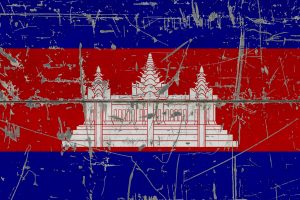The United States government yesterday imposed an arms embargo on Cambodia, citing long-standing concerns about human rights, corruption, and China’s growing influence in the country. According to a statement from the Commerce Department, the move will “restrict” access to “dual-use items,” “less-sensitive military items,” and “defense articles and defense services” by Cambodia’s military and intelligence agencies.
“The United States remains fully committed to Cambodia’s independence and the sovereignty of its people,” Commerce Secretary Gina Raimondo said in the statement. “We urge the Cambodian government to make meaningful progress in addressing corruption and human rights abuses, and to work to reduce the influence of the PRC military in Cambodia, which threatens regional and global security.”
This doesn’t mean a lot – the U.S. is not currently a supplier of arms to Cambodia – but it marks the latest in long list of measures designed to sanction Phnom Penh over its political repression and increasingly close relationship with China. In particular, Washington has become alarmed by the Chinese-funded refurbishment of the Ream Naval Base on Cambodia’s south coast, which it fears will pave the way for a permanent Chinese military presence on Cambodian soil. The Cambodian government denies the claim.
In its incipient pressure campaign aimed at reversing Cambodia’s pivot to China, the U.S. has sanctioned five high-ranking Cambodian military commanders and a timber tycoon – all close associates of Prime Minister Hun Sen – over the fierce crackdown of the past five years, which has seen the main opposition party banned and Cambodian civil society forced into a state of siege. The most recent officials to be sanctioned were Cambodian navy chief Admiral Tea Vinh, the brother of Defense Minister Tea Banh, and General Chau Phirun, director general of the Defense Ministry’s Material and Technical Services Department. The U.S. claims both men are conspiring to profit from the upgrades to Ream Naval Base.
The sanctions against Tea Vinh and Chau Phirun, announced last month, were also accompanied by a warning from the State Department against U.S. businesses investing in Cambodia, due to the country’s endemic corruption and the risk of possible involvement with entities involved in human rights abuses, trafficking, and the drug trade. These moves have taken place against a backdrop of congressional resolutions calling for the government to increase its pressure against the Cambodian government further.
The arms embargo came as the news broke that State Department Counselor Derek Chollet would pay a visit to Cambodia this week, in addition to Indonesia. While in Phnom Penh, Chollet “will discuss Cambodia’s upcoming chairmanship of ASEAN,” the State Department announced, with the implication that he will seek to engage with the Cambodian government over the controversial approach it plans to take as ASEAN chair toward the situation in Myanmar, as well as addressing other issues of regional import. How receptive the Cambodians will be to his views will no doubt hinge on how vocally he chooses to “reinforce U.S. support for civil society and the Cambodian people,” the other focus mentioned in the State Department’s statement about Chollet’s trip.
Herein lies the primary point of tension in Cambodia-U.S. relations. As I’ve written in these pages previously, one of the reasons that Hun Sen and his government have moved so close to China is precisely because of Western pressure over democracy and human rights issues, which they have long perceived as an attempt to undermine the power of the ruling Cambodian People’s Party. The logical implication is that any attempt to punish the Cambodian government will only further harden its intransigence and deepen its relationship on Beijing.
In October, Chinese Ambassador to Cambodia Wang Wentian said that the two nations were bound by an “ironclad brotherhood,” and in a clear reference to the U.S. and other Western governments, said they would “tolerate no interference from external forces.” Similarly, Cambodia dismissed last month’s sanctions as “politically motivated,” while Hun Sen today told the U.S. government to go ahead and freeze the U.S.-based assets of Cambodian officials, stating that none had their assets there anyway.
The greatest leverage that Washington has over Phnom Penh – and the one threat that might shift Hun Sen’s calculus – is the possible revocation of the trade preferences that Cambodia enjoys under the Generalized System of Preferences (GSP), which smooth its access to the U.S. market, the largest for Cambodian-made clothes, footwear, bags, and travel products.
However, the revocation of the GSP would likely to harm the country’s garment and apparel manufacturing sector, potentially costing many thousands of jobs. It was for similar reasons that the European Union, in reaction to the CPP government’s recent harsh political crackdown, chose to suspend trade preferences on just a portion of Cambodia’s exports to the European market.
Anthony Nelson, a senior director for East Asia and the Pacific at international consultancy Albright Stonebridge Group, told the South China Morning Post recently that it was “very unlikely” that the Cambodian government would take enough steps to mollify its critics in Washington. At the same time, he said, U.S. policymakers recognized that the “understand a revocation of GSP would hurt vulnerable workers first, so perhaps some face-saving loosening of the political space can be found.”
Even if that were true, it would still leave the fundamental issues in Cambodia-U.S. relations unresolved. Given the recent hardening of attitudes on both sides, progress now requires one of two things: either for the U.S. to compromise on values – to soften its human rights advocacy – or for the Cambodian government to compromise on domestic politics: to introduce significant political reforms.
Neither of these looks likely at the present juncture, ensuring that the spiral of mutual incomprehension that has marked recent relations between Washington and Phnom Penh will continue for the foreseeable future.

































